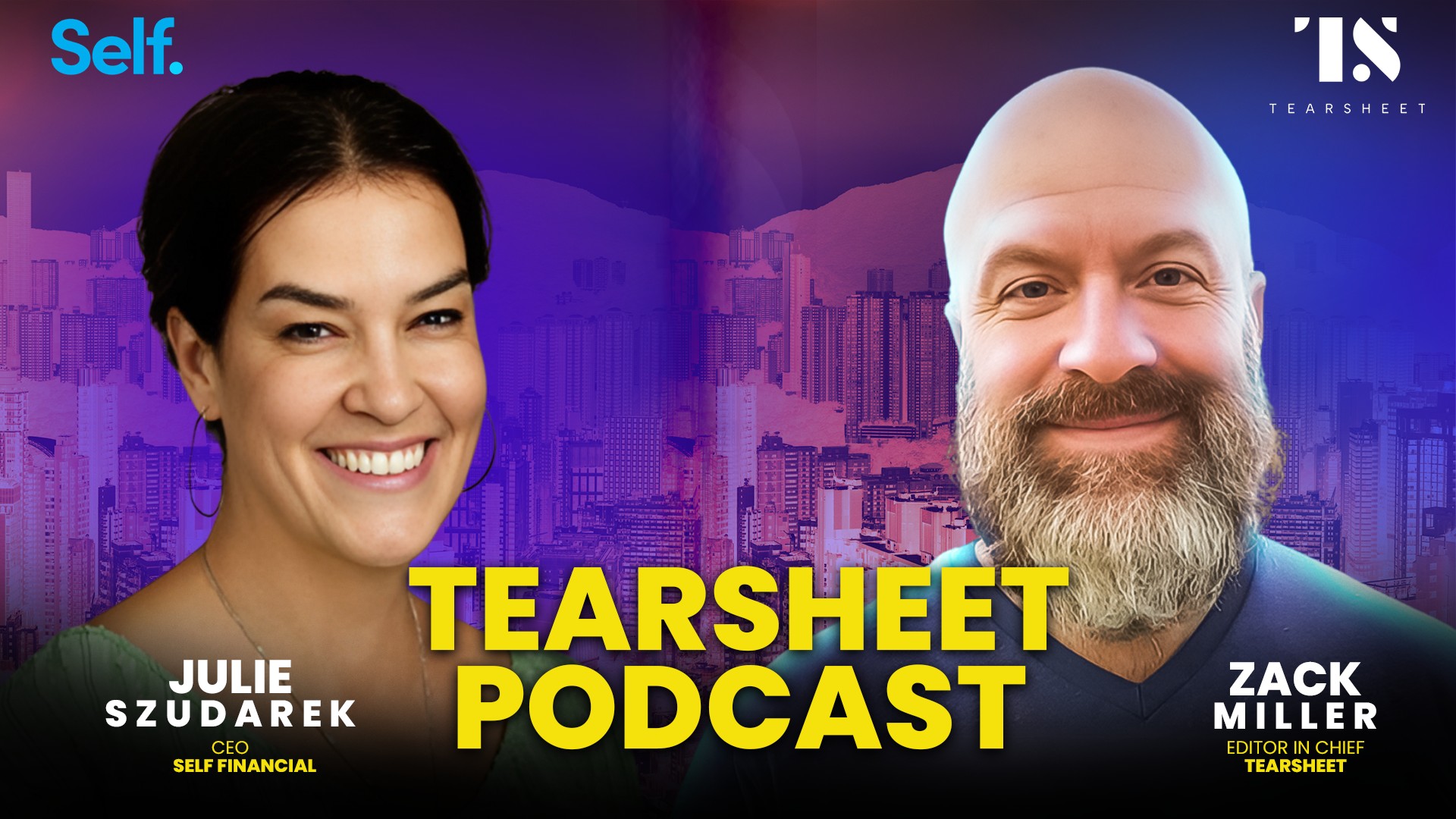Self Financial’s approach to expanding credit access through product innovation with Julie Szudarek
- Self Financial now offers secured credit cards with a $100 deposit and no mandatory credit builder account, addressing gaps in credit-building options.
- CEO Julie Szudarek discusses how product decoupling and educational initiatives are expanding financial access for underserved consumers.

Financial inclusion remains one of the most pressing challenges in today’s economy. Millions of Americans struggle to access basic financial services simply because they lack a credit history or have damaged credit. This gap in our financial system doesn’t just create inconvenience – it perpetuates cycles of financial inequity that can last generations.
In my latest episode of Tearsheet, I sat down with Julie Szudarek, CEO of Self Financial, a company working at the forefront of this challenge. Julie took the helm at Self just over a year ago, bringing over 20 years of leadership experience from companies like Groupon and Atida. Though fintech is a new arena for her, Julie’s expertise in building customer-focused businesses is exactly what’s needed to tackle financial inclusion at scale.
“I’ve never done fintech before,” Julie told me candidly. “But what I bring to the table is a deep understanding of how to build customer-focused businesses that are sustainable over time.” Her mission at Self aligns well with the broader movement toward more accessible financial services: “We are only here to make outcomes for our customers better than before they started working with Self.”
Listen to the full episode
Subscribe: Apple Podcasts | SoundCloud | Spotify
Watch to the full episode
Expanding Access to Credit: Why Decoupling Secured Credit Cards Matters
For many, the road to improving their credit scores starts with tools that are often out of reach. One of Self’s flagship products, the secured credit card, used to require customers to open a credit builder account, but that has changed.
“We saw so much demand from customers who maybe didn’t want this credit builder experience but wanted a secured card,” Julie explains. “So we found a way to make that available directly.”
Now, Self’s secured credit cards are accessible without a prior credit builder account, requiring only a $100 deposit and no hard credit check. “As far as we can tell, our deposit is the lowest in the industry,” she adds. This move aims to make credit builder apps more flexible and financial inclusion more achievable.
Customer Journey: Meeting People Where They Are
Julie emphasizes that building credit is not a one-size-fits-all process. “Our customers are on a journey,” she says. Julie explains how many arrive at Self through word of mouth, traditional marketing, and partnerships.
“More than 25% of our customers say they came to us from word of mouth,” she shares. She highlights how real customer success stories drive organic growth. Self also collaborates with affiliate partners. Such as lenders who redirect applicants denied for an auto loan due to poor credit scores, offering them a way to rebuild credit.
Beyond products, education plays a key role. “Sixty-five percent of our customers say they had no financial education growing up,” Julie notes. Self responds with resources aimed at demystifying credit, interest rates, and savings strategies.
Building a Fintech Product Suite for Long-Term Customer Needs
Since becoming CEO, Julie has focused on broadening Self’s product offerings. Especially beyond secured credit cards and credit builder accounts. “One of the things I noticed when I started was that we were limited in the number of products we had,” she says.
Customers who completed their credit-building journey had nowhere else to go. “We were just saying goodbye to customers,” Julie reflects. Now, Self is working on graduation products, like unsecured credit cards. The aim is to serve customers as they move forward financially.
“We should be keeping customers on our platform forever,” Julie states. This approach also aligns with fintech solutions focused on lifetime customer value.
Partnerships and Fintech Collaboration for Broader Access
The collaboration with traditional banks and organizations is essential to expanding Self’s reach. “We have partnerships with banks like Regions Bank, which offers our rent reporting solution to their customers,” she says.
Julie says that organizations like Pathway Homes found a connection between homeownership success and Self’s products. Customers who succeeded in homeownership often had Self’s products on their credit reports. This demonstrates the positive impact of Self’s products on financial outcomes. “They reached out to us because they kept seeing Self show up in their customers’ credit files,” Julie recounts.
These partnerships extend Self’s mission of financial inclusion. They do so by embedding credit-building tools into larger ecosystems.
The Big Ideas
- Decoupling Secured Credit Cards for Easier Access. “We decoupled the secured card so customers don’t need a credit builder account first. It’s about reducing barriers.”
- The Power of Low Deposit and No Credit Check. “Our deposit is $100, and for many, there’s no hard credit check. That makes it much less intimidating for people facing rejection.”
- Customer Education as a Core Focus. “About 65% of our customers say they had no financial education. So we focus on teaching them about interest, compounding, and managing credit.”
- Expanding Product Offerings to Keep Customers Engaged. “We were limited in what we offered. Now we’re focusing on products that meet customers where they are and help them keep growing financially.”
- Partnerships to Reach More Communities. “Regions Bank and Pathway Homes are some of our key partners — together, we’re helping more people build credit who might otherwise be left out.”








